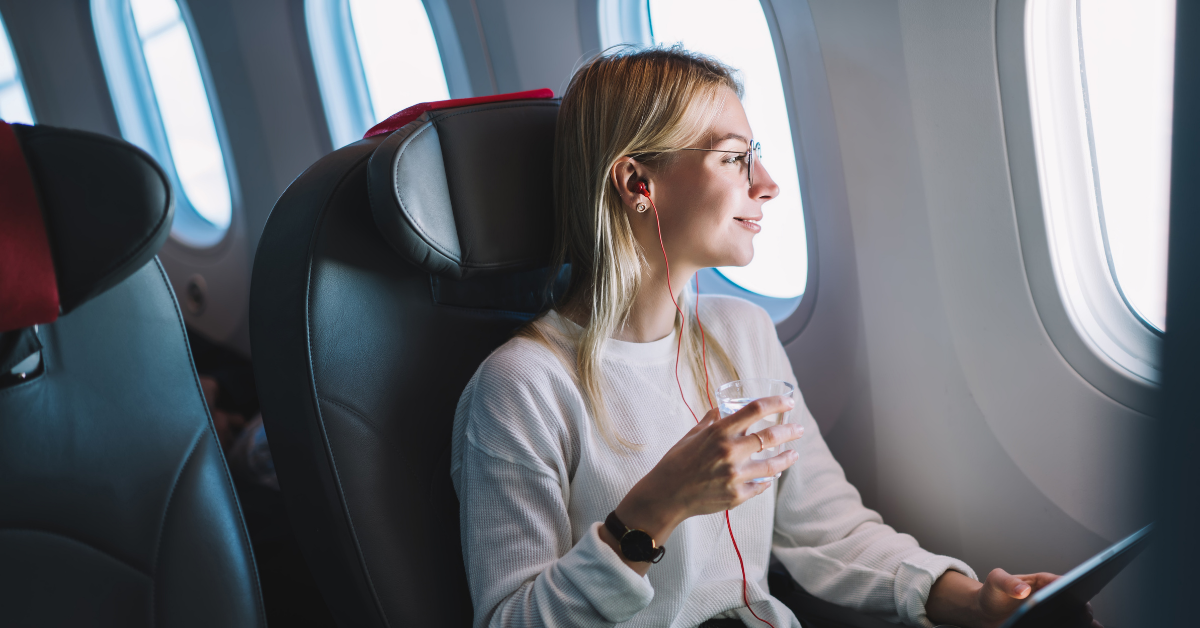Can Plane Travel Worsen Tinnitus or Hearing Loss Symptoms?

Do you have a long-haul or domestic flight coming up? If you are experiencing tinnitus or hearing loss, you may be wondering how your aeroplane journey could affect your ears. In this article, we share our insights on how and why flying can impact tinnitus or hearing loss symptoms.
How can plane travel affect your hearing loss?
If you have hearing loss, either due to age or frequent exposure to loud noise, flying may temporarily exacerbate the problem; however, it’s not common for flying to trigger long-term hearing loss.
‘Aeroplane ear’ can cause temporary hearing loss or ear issues
Aeroplane ear (also known as airplane ear, barotitis media, aerotitis media) happens when the eardrum is pushed out or pulled in due to changes in middle ear pressure. It is a common occurrence for many people when planes take off or land and is characterised by a feeling of fullness, a ‘bubble’ or general discomfort in your middle ear, along with muffling of sounds or trouble hearing. It can be irritating, but it’s hardly ever permanent.
What triggers aeroplane ear?
If the air pressure in your middle ear and the air pressure in your environment change rapidly, sometimes your eustachian tube (a narrow passage in the middle ear that regulates pressure) can’t keep up. This is most likely to happen when the aeroplane is ascending or descending.
How can you fix aeroplane ear?
-
Swallowing or yawning opens the eustachian tube, equalising the air pressure. This helps ‘pop’ your ears. Chewing gum or sucking lollies can help too; that’s why most airlines hand out lollies on flights!
-
In the unlikely event that your aeroplane ear doesn’t dissipate within 24 hours, we recommend that you see a hearing expert.
Listening to music on aeroplanes may contribute to long-term hearing issues
While music can keep you calm and entertained during a flight, it’s important to take care of your ears while doing so. Long-term noise-induced hearing loss (NIHL) is becoming increasingly common in people who listen to loud music through their headphones on a regular basis. Aeroplanes are a particularly risky environment as your headphones will be competing with engine noises and conversations around you, so you will likely want to turn the volume up.
How to prevent NIHL from listening to music:
-
Use noise cancelling headphones so you won’t have to turn up your volume over competing noises.
-
Take listening breaks; to reduce the risk of NHIL, take a 10 minute break from your headphones for every 60 minutes of listening.
- Keep the volume at or below the 50% mark on your device. If you need a little extra help blocking noise, wear a headband over your earphones to dampen the sound around you.
Can plane travel worsen your tinnitus?
Tinnitus is a phantom sound (usually a high-pitched ringing) that your brain may hear in response to auditory damage. The intensity of this sound varies from person to person and may or may not be permanent. Although unlikely, it's possible that airplane travelling by can temporarily impact or cause onset of tinnitus, due to the engine noise and impact of pressure changes to the middle ear.
How can you prevent tinnitus while flying?
-
Avoid using earplugs during a flight. If you seal out all other noise, tinnitus may become more noticeable. .
-
If you get aeroplane ear, it can temporarily worsen your tinnitus. Follow our tips above for preventing and getting rid of aeroplane ear; once it dissipates, your tinnitus will return to its former level.
Although some people notice changes in their tinnitus, rest assured that plane engine noise is unlikely to impact it; many people actually find that the ringing sound is drowned out by that constant background noise on aeroplanes.
If you are concerned about tinnitus or hearing loss, it might be time to make that appointment and seek unbiased, expert advice. Hearing health is easy and convenient with the New Zealand hearing team! To begin your journey, book a no-fuss diagnostic hearing test at your local New Zealand Hearing clinic.


